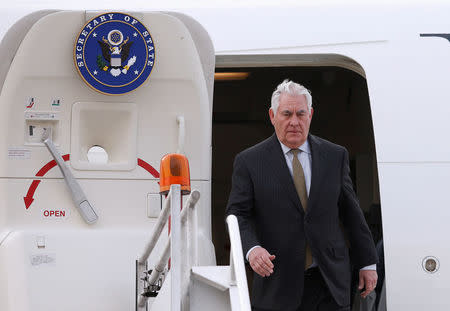Mexico debate swirls over 'opaque' talks with U.S. as Tillerson lands

By Gabriel Stargardter MEXICO CITY (Reuters) - The United States' top diplomat landed in Mexico on Thursday with debate swirling over the government's efforts to win favor with Washington and save the NAFTA pact from collapse, sparking concerns it is ceding sovereignty to its northern neighbor. Mexico has been at pains to prove itself a good ally to the United States on combating drug trafficking and immigration, in hopes this would help efforts to renegotiate the North American Free Trade Agreement on as favorable terms as possible. Those secret efforts sprang into view this week, when Reuters exclusively reported that Mexico is considering allowing U.S. air marshals aboard commercial cross-border flights, igniting a debate over what lengths Mexico should go to in order to win favor with its top trade partner. "The question is, what else is (Foreign Minister Luis) Videgaray giving to Trump and his collaborators in exchange for preserving NAFTA?" Salvador Garcia Soto asked in his El Universal newspaper column, decrying Videgaray's "opaque" maneuvering. U.S. Secretary of State Rex Tillerson landed in Mexico City on Thursday afternoon and was due to have dinner with Videgaray and other senior Mexican government and national security officials at U.S. Ambassador Roberta Jacobson's residence. Although Tillerson has not been a prominent player in the NAFTA discussions, the future of the treaty is certain to loom over his visit, especially at a trilateral meeting with Canada's Foreign Minister Chrystia Freeland on Friday. Mexico's government, and particularly the foreign ministry, has pushed hard to defend NAFTA, a lynchpin of its export-led economy, ahead of a July 2018 election in which the ruling Institutional Revolutionary Party is currently polling third. "All our efforts right now are based around NAFTA and making sure the pact doesn't collapse," said a senior Mexican diplomat. Videgaray has said closer cooperation with the United States is the best way to achieve Mexico's foreign policy aims. "Obviously that would be something that we strongly want to avoid," Videgaray said at an event in New York late last year, referring to NAFTA collapsing. "We realize that we could achieve much more by being constructive and by approaching the relationship looking for common ground ... with very active cooperation." Quizzed by ruling party lawmakers on Tuesday, Videgaray denied the air marshals were part of any NAFTA quid pro quo, but said the government was studying the plan. CLOSER TIES Tillerson's Mexico City visit is the first leg in a week-long Latin America trip in which he hopes to keep up pressure on Venezuelan President Nicolas Maduro over his restrictions on domestic political opposition. Earlier on Thursday, in a speech at his alma mater University of Texas at Austin, Tillerson raised the prospect that the Venezuelan military could decide to oust President Nicolas Maduro but said he did not know whether that would happen. Tillerson insisted the Trump administration was not advocating "regime change" in Venezuela but said it would be "easiest" if Maduro chose to leave power on his own. In his most important regional policy statement since his appointment, Tillerson also warned Latin American countries against excessive reliance on economic ties with China, while sounding alarm over Russia's growing presence. Tillerson is due to meet with Mexican President Enrique Pena Nieto, and Videgaray for a second time, on Friday, and they are certain to discuss Central American migration and drug trafficking, two areas in which Mexico has sought to work more closely with the United States since U.S. President Donald Trump took office. Videgaray, who flew to Washington earlier this week ahead of Tillerson's arrival, is Pena Nieto's most trusted adviser, and has forged close ties with Trump's son-in-law, Jared Kushner, who serves as a senior advisor to the president. The influential foreign minister has stepped to the fore of regional Latin American efforts to condemn Maduro's government and has also proved a good friend to the Trump administration on sensitive foreign policy issues including North Korea, Israel and Honduras. Former Mexican diplomat and intelligence official Gustavo Mohar said it would be foolish to assume such efforts could yield a positive NAFTA result. "The priority of Mexico's foreign policy in the short-term has been to reach an agreement with the Trump government on trade," he said. "But that doesn't guarantee you anything, because this guy (Trump) is very unpredictable." (Reporting by Gabriel Stargardter; Additional reporting by David Brunnstrom, Matt Spetalnick and Jon Herskovitz; Editing by Diane Craft and Cynthia Osterman)
